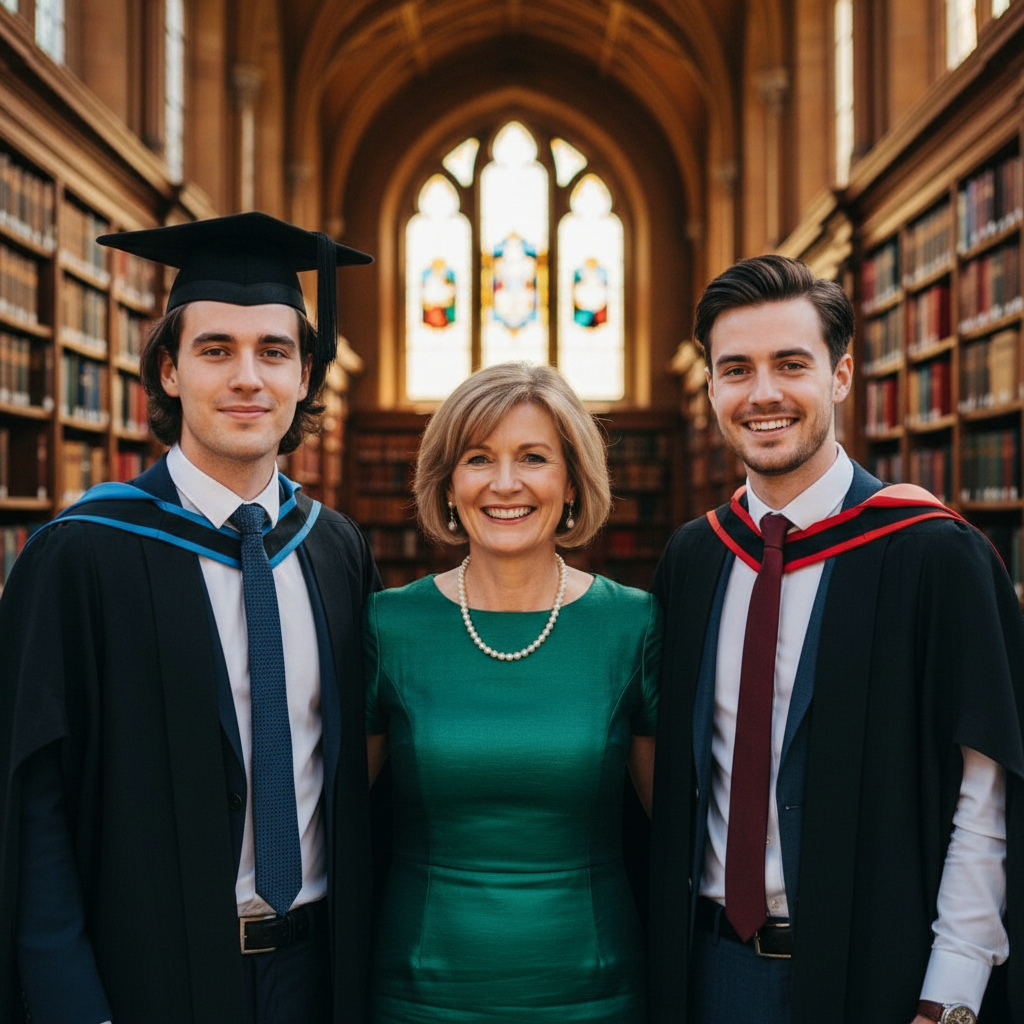Mrs. Eleanor Davis had lived her life in the rhythm of quiet things: the soft flutter of book pages, the hum of a kettle, the gentle scratch of pencil on old library cards. At 63, in her cottage on the edge of Wilmont, Vermont, her world was pressed flowers, poetry margins, and the comforting hush of solitude.
She had never married. Never traveled far. Her life was a soft loop of days until the summer twenty-four years ago—the summer that changed everything.
It began with a volunteer reading program at Maplewood County Home, a crumbling orphanage with more dust than dreams. She hadn’t expected to find anyone there who would stay in her heart. But then she saw them: two small boys, identical but utterly unlike. Samuel sat rigid, his tiny fingers clenched around a puzzle piece. Thomas, meanwhile, stared at a sunbeam on the floor, tracing it with a finger like it was magic.
They were six. Silent. Unclaimed. No records. No birthdays. The fire that supposedly took their parents left no survivors and no paperwork. Just two boys with no last name.
The system labeled them unplaceable.
Eleanor, childless and near retirement, had no license, no background checks, no plan. But that night, after the reading session, she sat in her tiny kitchen with the scent of lavender tea in the air and whispered aloud, “Maybe just for now.”
She brought them home the next day.
At first, they slept curled like foxes on a borrowed couch. They barely spoke, only nodded, clung to each other like matching shadows. Eleanor read them poems at bedtime—Neruda, Dickinson, Frost. She baked scones they didn’t eat. She left the door to the spare room open. And slowly, they came to her.
Samuel asked questions about the stars. Thomas painted over old newspapers with crushed berries and mud. One morning, Eleanor found a note under her teacup, written in shaky pencil:
“Thank you for the purple blanket. We never had soft before.”
They called her Mama Eleanor by Christmas.
Years passed like pages turning in a book. She taught them to bake bread and how to press flowers in dictionaries. Samuel grew sharp—his mind lived in equations. Thomas lived in colors and mess. Eleanor sold her grandmother’s necklace to buy Thomas a secondhand easel. She auctioned her vinyl collection to hire a math tutor for Samuel.
She worked nights in the university archives, cataloging ancient maps with frayed edges and water stains. She often skipped dinners, but the boys never went without.
When college came, Eleanor sat in a folding chair under the maple tree and watched them read their acceptance letters. Samuel to Princeton, Thomas to Columbia. Full scholarships. Full hearts. She wept in secret that night, folded two letters in her lilac-scented stationery, and handed them off as they boarded the train:
“Whatever you become, always remember who held your hand first.”
At first, they called. Weekly. Then monthly. They sent pictures. Birthday packages arrived—drawings from Thomas, long letters from Samuel. They promised summer visits.
But time, like memory, fades.
By her 60th birthday, Eleanor sat alone in the university library’s great hall. The staff had thrown her a modest party. A single candle on a plum cake. Her green dress, faded now, still smelled faintly of lavender sachets. She wore her only pearl necklace—the one she’d saved.
Then they walked in.
Samuel, tall and exact, wore his black graduation gown like armor. Thomas was softer, his crimson stole loosely draped, a streak of green paint still visible on his sleeve.
They stood across the room.
Their eyes met hers.
They didn’t smile.
They didn’t wave.
They walked past.
Later that night, Eleanor sat by the fireplace with trembling fingers and read the headline online:
“Long-Lost Heirs Discovered: DNA Connects Twin Brothers to East Coast Estate.”
A wealthy uncle had come forward, newly informed by genealogical research. The boys—her boys—were now someone else’s legal family.
A letter arrived days later. Cold. Formal.
“Due to newly verified familial ties, all prior custodial claims are null. Transfer of rights is complete.”
They didn’t call.
Not to explain. Not to say goodbye.
In the weeks that followed, her home fell silent again. The lavender room, once filled with laughter and chalk dust, grew dim. The easel gathered dust. The telescope Samuel once pointed at the stars sat unused by the window.
Only one photo remained—framed on her mantel:
The three of them, arms around each other at the reference desk, laughing. Samuel missing a tooth. Thomas’s shirt stained with paint. Eleanor in her floral cardigan, alive with joy.
She never took it down.
Some afternoons, she’d reread their childhood letters—spidery handwriting on crumpled paper.
“You make soup taste like safety.”
“I hope you never get lost. Because we’d be lost without you.”
“We love you, Mama Eleanor. Don’t ever disappear.”
But they did.
They disappeared into a world of bloodlines and money, into a story rewritten without her.
And yet, every evening, Eleanor lit a single candle in the lavender room. Not because she believed they’d return. Not anymore.
But because once, love lived there.
And she’d promised to always leave the light on—for who they had been.
Not for who they became.
